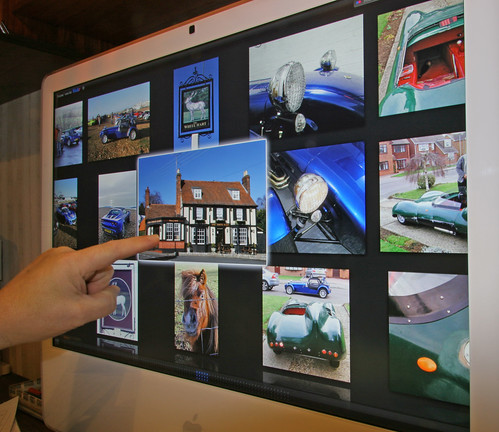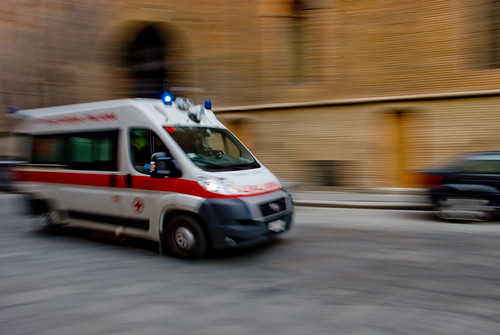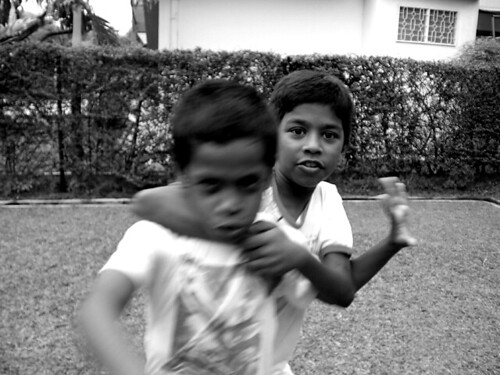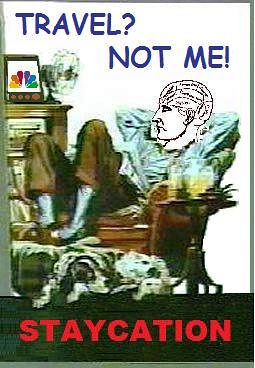Feast of the Holy Family
Family Pictures on a Touchscreen
Family Pictures on a Touchscreen
Picture: cc exfordy
Sisters and brothers, have you ever marvelled at the things you can do with a touchscreen? The kind that we find on a smartphone, an IPad or a tablet PC? I myself don’t use a touchscreen on a regular basis, but I’ve watched other people do so. And I’ve been fascinated. One moment you’re looking at a vivid image on the screen. And then, with a tap of a finger you can make the screen display a completely new and different picture. Or, you can remain with the same picture but, using your thumb and forefinger, you can make it bigger, or smaller. You can even make the screen display different parts of the same image. You can zoom in to focus on something in a corner, for example. Or zoom out to see more of the background.
Those of us who enjoy the luxury of playing with these devices on a daily basis probably don’t even think twice about it. But isn’t it a truly marvellous thing to be able to do all this? To change the way an image is displayed by simply touching the screen with a finger? And I’m not thinking only about the technology involved. Although it must be very interesting. What I find even more amazing is what such a device can do for us. Whether we realise it or not, the touchscreen gives us the power to look at a given thing–to look at life itself, really–from many different angles. To see familiar things in new and surprising ways. So that we can appreciate reality more deeply. And, hopefully, live life more fully.
I mention this because I think that our Mass readings for today do for us something very similar. Just as a touchscreen can help us to see ordinary things from fresh perspectives, so do our Mass readings display for us new ways of looking at something that we may think we already understand very well. What images come to your mind, for example, when you think of family? Where do families come from? What are they for? What does it feel like to live in a good family? Image and origin, purpose and feeling. These are some of the questions concerning family life that our readings help us to answer today.
I’m not sure, sisters and brothers, but I think that probably the first image that comes to most of ours minds when we think of a family is that of parents and children, and perhaps grandparents, all living together in the same household. And along with this image of the family, we also have a common view of how families come about. Their origin. We tend to think that families originate first from a decision that people make for themselves. We say, for example, that so and so is starting a family. As if a family is something that one can start at will. And if someone else decides to remain unmarried, we tend to think that such a person has no family of his or her own. And yet, when we turn to the images displayed on the touchscreen of our readings today, we get a rather different perspective.
Consider the story of Hannah in the first reading. Notice how, for long years, she had wanted a child of her own, but was unable to conceive. Much as she wanted to start a family, she could not. It was only after she had gone to pray at the Temple in Jerusalem that she finally gave birth to a baby boy. Whom she named Samuel. What does this tell us, sisters and brothers, if not that a family is not first of all something that one starts for oneself? A decision that one makes. A family is rather a precious gift that one receives from God. God is the Origin of family life.
Isn’t this why, immediately after Samuel is weaned–when he is old enough to survive apart from his mother–Hannah brings him to the Temple and dedicates him to the service of the Lord for his whole life? For Hannah, the child was a gift from God. So, he should live his life for God. But not only that, Hannah’s dedication of Samuel also implies a much broader image of family life than one that consists only of parents and their children. For if God is the child’s proper Origin, then the People of God are his proper family. And Samuel’s service in the Temple of God can properly be considered family service.
The second reading presents us with a similar picture, when it invites us to think of the love that the Father has lavished upon us by letting us be called God’s children. More than just children of our earthly parents, we are all children of God. And, as members of God’s family, we are all to love one another. To live our lives in service of each other. Whatever may be the colour of our skins, or the countries of our birth, or the languages we speak.
The second reading also goes on to indicate to us the purpose of family life as seen from this broader perspective. After telling us to love one another as Christ told us to, the reading goes on to say that whoever keeps his commandments lives in God and God lives in him. More than just generating and nurturing children–as important as this is–family life is ultimately about living in God. Living in God by living in the love that God has shown us in Christ Jesus our Lord. The love that led Jesus to be born for us in a manger. The love that saw him give his life for us on the Cross. The same love that we celebrate at this and at every Eucharist.
And yet, this broad view of family life should not lead us to think poorly of our own immediate families. Much less to take them for granted. For many of us–though by no means all–living a life of love, living a life in God, will usually mean living together with particular members of an immediate family. With spouse, parents, grandparents, children, sisters and brothers. And living such a life means caring for specific members of such a family. Which leads us to the final question that our readings help us to answer today. What should it feel like to live a good family life?
The gospel provides us with an answer that is probably quite surprising. For it’s likely that we may think of life in a good family as being one that’s free from tension. As being more or less plain sailing all the way. And yet, tension is precisely what we find in the gospel. Here both Jesus and his earthly parents struggle to negotiate the tension between the obligations of the immediate family and those of the family of God. As the son of Mary and Joseph, Jesus really should have informed them of his intention to remain in the Temple. Just as it was only proper–at least at this stage of his life–that he should return with them to Nazareth and live under their authority. And yet, as Son of his Father in Heaven, it was also proper that he should be busy with his Father’s affairs. What is this sisters and brothers if not tension? But a healthy tension. A necessary tension. For we are told that, living in this way, Jesus increased in wisdom, in stature, and in favour with God and men. It was precisely their willingness to live this tension courageously that made Jesus, Mary and Joseph a Holy Family.
This then, sisters and brothers, is what family looks like when seen through the eyes of faith. This is the image of family life displayed on the touchscreen of our readings. Sisters and brothers, how ready are we to allow our hearts to be touched by this image? How willing are we to live the reality of family life in God today?
Those of us who enjoy the luxury of playing with these devices on a daily basis probably don’t even think twice about it. But isn’t it a truly marvellous thing to be able to do all this? To change the way an image is displayed by simply touching the screen with a finger? And I’m not thinking only about the technology involved. Although it must be very interesting. What I find even more amazing is what such a device can do for us. Whether we realise it or not, the touchscreen gives us the power to look at a given thing–to look at life itself, really–from many different angles. To see familiar things in new and surprising ways. So that we can appreciate reality more deeply. And, hopefully, live life more fully.
I mention this because I think that our Mass readings for today do for us something very similar. Just as a touchscreen can help us to see ordinary things from fresh perspectives, so do our Mass readings display for us new ways of looking at something that we may think we already understand very well. What images come to your mind, for example, when you think of family? Where do families come from? What are they for? What does it feel like to live in a good family? Image and origin, purpose and feeling. These are some of the questions concerning family life that our readings help us to answer today.
I’m not sure, sisters and brothers, but I think that probably the first image that comes to most of ours minds when we think of a family is that of parents and children, and perhaps grandparents, all living together in the same household. And along with this image of the family, we also have a common view of how families come about. Their origin. We tend to think that families originate first from a decision that people make for themselves. We say, for example, that so and so is starting a family. As if a family is something that one can start at will. And if someone else decides to remain unmarried, we tend to think that such a person has no family of his or her own. And yet, when we turn to the images displayed on the touchscreen of our readings today, we get a rather different perspective.
Consider the story of Hannah in the first reading. Notice how, for long years, she had wanted a child of her own, but was unable to conceive. Much as she wanted to start a family, she could not. It was only after she had gone to pray at the Temple in Jerusalem that she finally gave birth to a baby boy. Whom she named Samuel. What does this tell us, sisters and brothers, if not that a family is not first of all something that one starts for oneself? A decision that one makes. A family is rather a precious gift that one receives from God. God is the Origin of family life.
Isn’t this why, immediately after Samuel is weaned–when he is old enough to survive apart from his mother–Hannah brings him to the Temple and dedicates him to the service of the Lord for his whole life? For Hannah, the child was a gift from God. So, he should live his life for God. But not only that, Hannah’s dedication of Samuel also implies a much broader image of family life than one that consists only of parents and their children. For if God is the child’s proper Origin, then the People of God are his proper family. And Samuel’s service in the Temple of God can properly be considered family service.
The second reading presents us with a similar picture, when it invites us to think of the love that the Father has lavished upon us by letting us be called God’s children. More than just children of our earthly parents, we are all children of God. And, as members of God’s family, we are all to love one another. To live our lives in service of each other. Whatever may be the colour of our skins, or the countries of our birth, or the languages we speak.
The second reading also goes on to indicate to us the purpose of family life as seen from this broader perspective. After telling us to love one another as Christ told us to, the reading goes on to say that whoever keeps his commandments lives in God and God lives in him. More than just generating and nurturing children–as important as this is–family life is ultimately about living in God. Living in God by living in the love that God has shown us in Christ Jesus our Lord. The love that led Jesus to be born for us in a manger. The love that saw him give his life for us on the Cross. The same love that we celebrate at this and at every Eucharist.
And yet, this broad view of family life should not lead us to think poorly of our own immediate families. Much less to take them for granted. For many of us–though by no means all–living a life of love, living a life in God, will usually mean living together with particular members of an immediate family. With spouse, parents, grandparents, children, sisters and brothers. And living such a life means caring for specific members of such a family. Which leads us to the final question that our readings help us to answer today. What should it feel like to live a good family life?
The gospel provides us with an answer that is probably quite surprising. For it’s likely that we may think of life in a good family as being one that’s free from tension. As being more or less plain sailing all the way. And yet, tension is precisely what we find in the gospel. Here both Jesus and his earthly parents struggle to negotiate the tension between the obligations of the immediate family and those of the family of God. As the son of Mary and Joseph, Jesus really should have informed them of his intention to remain in the Temple. Just as it was only proper–at least at this stage of his life–that he should return with them to Nazareth and live under their authority. And yet, as Son of his Father in Heaven, it was also proper that he should be busy with his Father’s affairs. What is this sisters and brothers if not tension? But a healthy tension. A necessary tension. For we are told that, living in this way, Jesus increased in wisdom, in stature, and in favour with God and men. It was precisely their willingness to live this tension courageously that made Jesus, Mary and Joseph a Holy Family.
This then, sisters and brothers, is what family looks like when seen through the eyes of faith. This is the image of family life displayed on the touchscreen of our readings. Sisters and brothers, how ready are we to allow our hearts to be touched by this image? How willing are we to live the reality of family life in God today?










